Nigel S., Chambers S., Johnson R. Operations Management
Подождите немного. Документ загружается.


Physical distribution management and the Internet
In supply chains dealing with tangible products, the products need to be transported to
customers. This is called physical distribution management, but sometimes the term logistics,
or simply distribution, is used. The potential offered by Internet communications in physical
distribution management has had two major effects. The first is to make information available
more readily along the distribution chain. This means that the transport companies, ware-
houses, suppliers and customers that make up the chain can share knowledge of where goods
are in the chain. This allows the operations within the chain to coordinate their activities
more readily, with potentially significant cost savings. For example, an important issue for
Part Three Planning and control
384
Our Global Sourcing and Operating Guidelines help
us to select business partners who follow workplace
standards and business practices that are consistent
with our company’s values. These requirements are
applied to every contractor who manufactures or finishes
products for Levi Strauss & Co. Trained inspectors closely
audit and monitor compliance among approximately
600 cutting, sewing, and finishing contractors in more
than 60 countries . . . The numerous countries where Levi
Strauss & Co. has existing or future business interests
present a variety of cultural, political, social and economic
circumstances . . . The Country Assessment Guidelines
help us assess any issue that might present concern in
light of the ethical principles we have set for ourselves.
Specifically, we assess . . . the . . . Health and Safety
Conditions Human Rights Environment, the Legal System
and the Political, Economic and Social Environment that
would protect the company’s commercial interests and
brand/corporate image. The company’s employment
standards state that they will only do business with
partners who adhere to the following guidelines:
● Child Labor: Use of child labor is not permissible.
Workers can be no less than 15 years of age and not
younger than the compulsory age to be in school.
We will not utilize partners who use child labor in
any of their facilities.
● Prison Labor/Forced Labor: We will not utilize prison
or forced labor in contracting relationships in the
manufacture and finishing of our products. We will
not utilize or purchase materials from a business
partner utilizing prison or forced labor.
● Disciplinary Practices: We will not utilize business
partners who use corporal punishment or other forms
of mental or physical coercion.
● Working Hours: While permitting flexibility in
scheduling, we will identify local legal limits on
work hours and seek business partners who do not
Short case
Extracts from Levi Strauss’s
global sour
cing policy
8
exceed them except for appropriately compensated
overtime. Employees should be allowed at least
one day off in seven.
● Wages and Benefits: We will only do business with
partners who provide wages and benefits that comply
with any applicable law and match the prevailing local
manufacturing or finishing industry practices.
● Freedom of Association: We respect workers’ rights
to form and join organizations of their choice and
to bargain collectively. We expect our suppliers to
respect the right to free association and the right to
organize and bargain collectively without unlawful
interference.
● Discrimination: While we recognize and respect
cultural differences, we believe that workers should
be employed on the basis of their ability to do the job,
rather than on the basis of personal characteristics
or beliefs. We will favor business partners who share
this value.
● Health and Safety: We will only utilize business
partners who provide workers with a safe and healthy
work environment. Business partners who provide
residential facilities for their workers must provide safe
and healthy facilities.
Physical distribution
management
Logistics
Distribution
Source: Corbis/Jose Luis Pelaez
M13_SLAC0460_06_SE_C13.QXD 10/20/09 9:45 Page 384
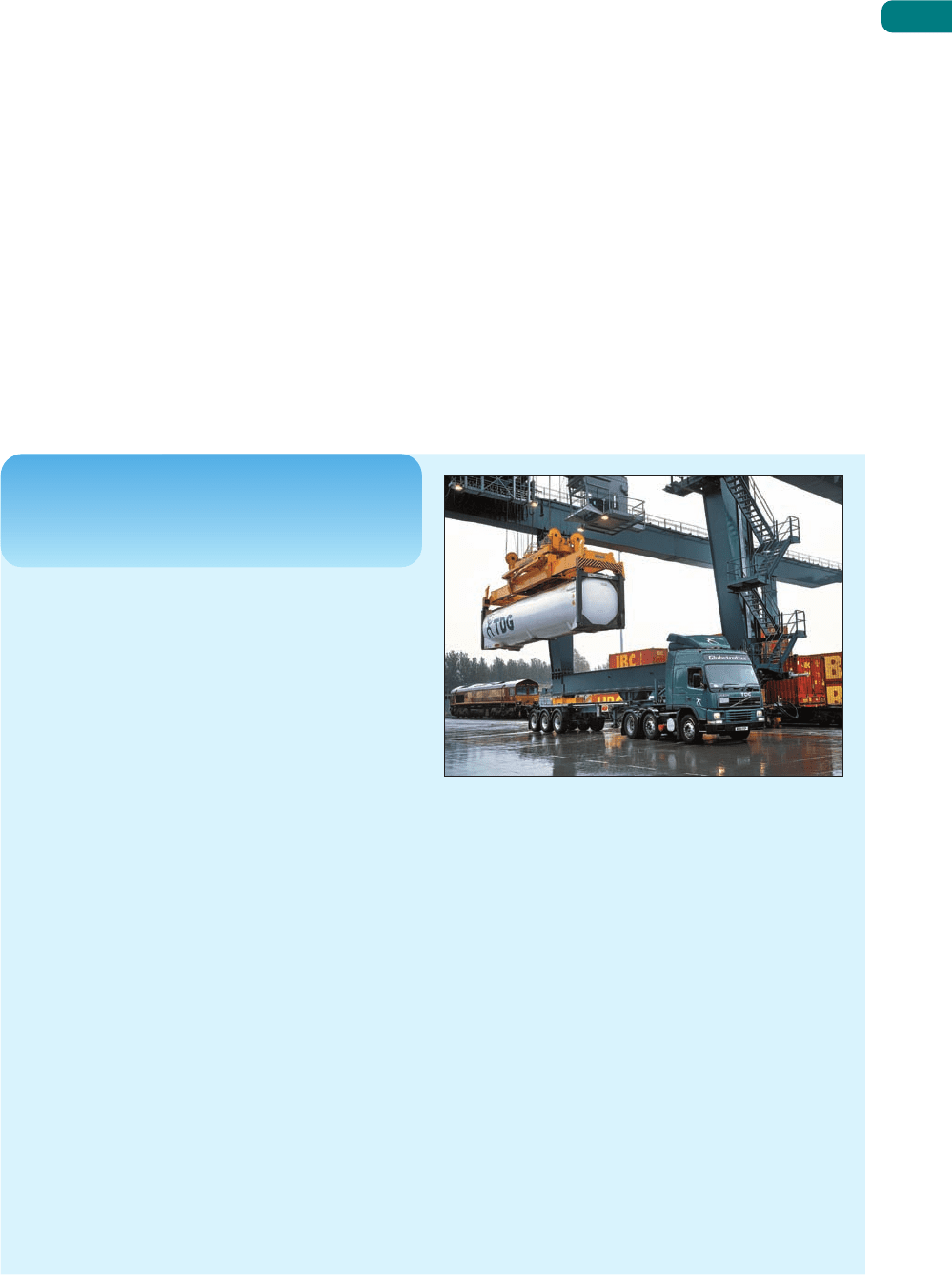
transportation companies is back-loading. When the company is contracted to transport
goods from A to B, its vehicles may have to return from B to A empty. Back-loading means
finding a potential customer that wants their goods transported from B to A in the right time
frame. Companies which can fill their vehicles on both the outward and return journeys will
have significantly lower costs per distance travelled than those whose vehicles are empty for
half the total journey.
The second impact of the Internet has been in the ‘business to consumer’ (B2C, see
the discussion on supply chain relationships later) part of the supply chain. While the last
few years have seen an increase in the number of goods bought by consumers online, most
goods still have to be physically transported to the customer. Often early e-retailers ran into
major problems in the order fulfilment task of actually supplying their customers. Partly
this was because many traditional warehouse and distribution operations were not designed
for e-commerce fulfilment. Supplying a conventional retail operation requires relatively large
vehicles to move relatively large quantities of goods from warehouses to shops. Distributing
to individual customers requires a large number of smaller deliveries.
Back-loading
Order fulfilment
Chapter 13 Supply chain planning and control
385
TDG are specialists in providing third-party logistics
services to the growing number of manufacturers and
retailers that choose not to do their own distribution.
Instead they outsource to companies like TDG, which
have operations spread across 250 sites that cover
the UK, Ireland, France, Spain, Poland and Holland,
employ 8,000 employees and use 1,600 vehicles.
They provided European logistics services through
their own operations in the Netherlands and Ireland and,
with the support of alliance partners, in several other
European companies.
‘There are a number of different types of company
providing distribution services’, says David Garman,
Chief Executive Officer of TDG, ‘each with different
propositions for the market. At the simplest level, there
are the “haulage” and “storage” businesses. These
companies either move goods around or they store
them in warehouses. Clients plan what has to be done
and it is done to order. One level up from the haulage
or storage operations are the physical distribution
companies, who bring haulage and storage together.
These companies collect clients’ products, put
them into storage facilities and deliver them to the
end-customer as and when required. After that there
are the companies who offer contract logistics. As a
contract logistics service provider you are likely to be
dealing with the more sophisticated clients who are
looking for better quality facilities and management and
the capability to deal with more complex operations.
One level further up is the market for supply chain
management services. To do this you have to be able
to manage supply chains from end to end, or at least
Short case
TDG serving the whole
supply chain
9
some significant part of the whole chain. Doing this
requires a much greater degree of analytical and
modelling capability, business process reengineering
and consultancy skills.’
TDG, along with other prominent logistics companies,
describes itself as a ‘lead logistics provider’ or LLP,
This means that they can provide the consultancy-led,
analytical and strategic services integrated with a sound
base of practical experience in running successful
‘on-the-road’ operations. ‘In 1999 TDG was a UK
distribution company’, says David Garman, ‘now we are
a European contract logistics provider with a vision to
becoming a full supply chain management company.
Providing such services requires sophisticated operations
capability, especially in terms of information technology
and management dynamism. Because our sites are
physically dispersed with our vehicles at any time spread
around the motorways of Europe, IT is fundamental
to this industry. It gives you visibility of your operation.
We need the best operations managers, supported by
the best IT.’
Source: TDG Logistics
M13_SLAC0460_06_SE_C13.QXD 10/20/09 9:45 Page 385
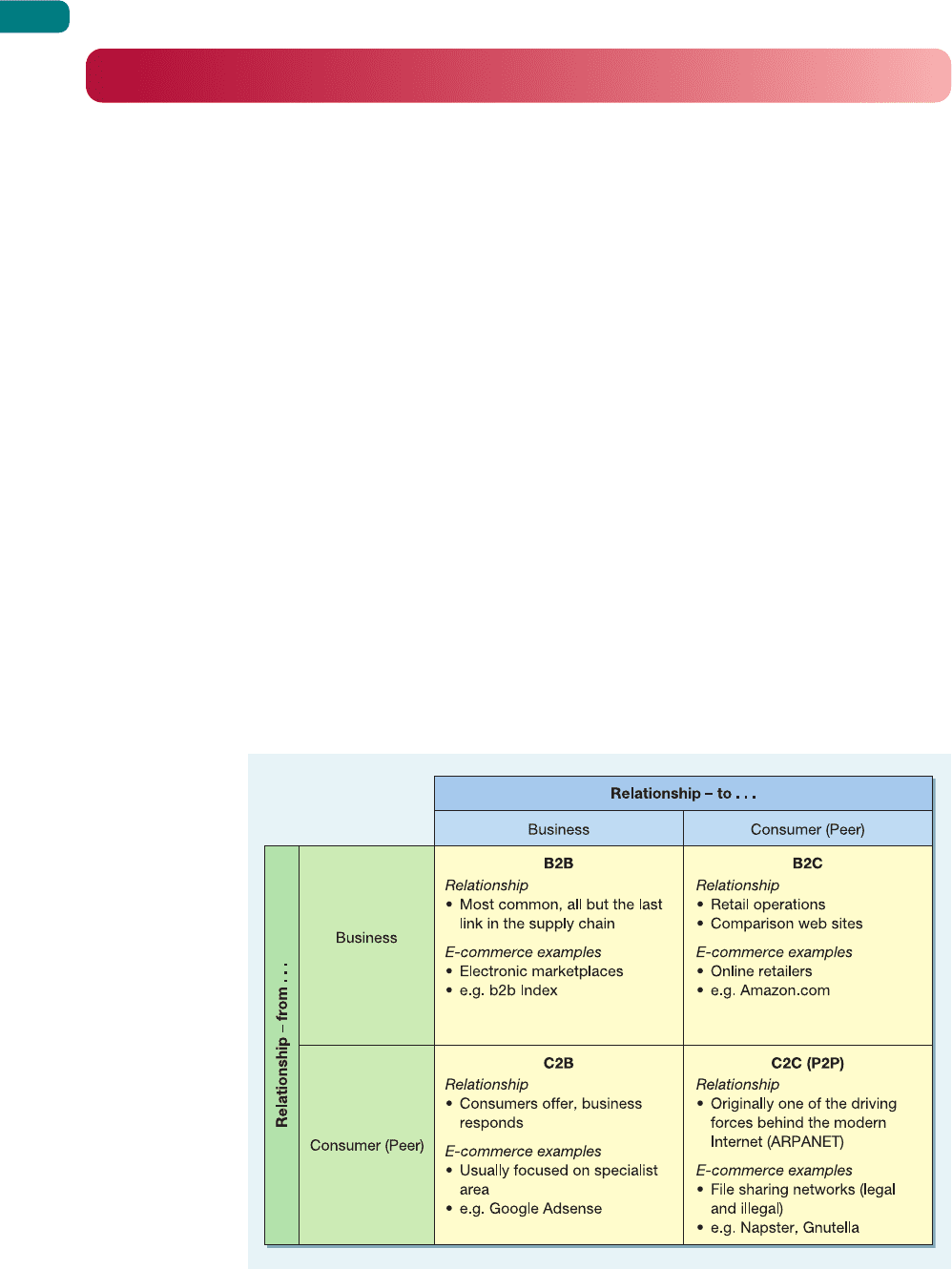
Part Three Planning and control
386
Types of relationships in supply chains
One of the key issues within a supply chain is how relationships with immediate suppliers
and customers should be managed. The behaviour of the supply chain as a whole is, after all,
made up of the relationships which are formed between individual pairs of operations in the
chain. It is important, therefore, to have some framework which helps us to understand the
different ways in which supply chain relationships can be developed.
Business or consumer relationships?
The growth in e-commerce has established broad categorization of supply chain relation-
ships. This happened because Internet companies have categorized market sectors defined by
who is supplying whom. Figure 13.5 illustrates this categorization, and distinguishes between
relationships that are the final link in the supply chain, involving the ultimate consumer, and
those involving two commercial businesses. So, business-to-business (B2B) relationships are
by far the most common in a supply chain context and include some of the e-procurement
exchange networks discussed earlier. Business-to-consumer (B2C) relationships include
both ‘bricks and mortar’ retailers and online retailers. Consumer-to-business (C2B) relation-
ships involve consumers posting their needs on the web (sometimes stating the price they are
willing to pay), companies then deciding whether to offer. Customer-to-customer (C2C) or
peer-to-peer (P2P) relationships include the online exchange and auction services and file
sharing services. In this chapter we deal almost exclusively with B2B relationships.
Types of business-to-business relationship
A convenient way of categorizing supply chain relationships is to examine the extent and
nature of what a company chooses to buy in from suppliers. Two dimensions are particularly
important – what the company chooses to outsource, and who it chooses to supply it. In terms
of what is outsourced, key questions are, ‘how many activities are outsourced (from doing
everything in-house at one extreme, to outsourcing everything at the other extreme), and
Figure 13.5 The business–consumer relationship matrix
Business to business
Business to consumer
Consumer to business
Customer to customer
M13_SLAC0460_06_SE_C13.QXD 10/20/09 9:45 Page 386
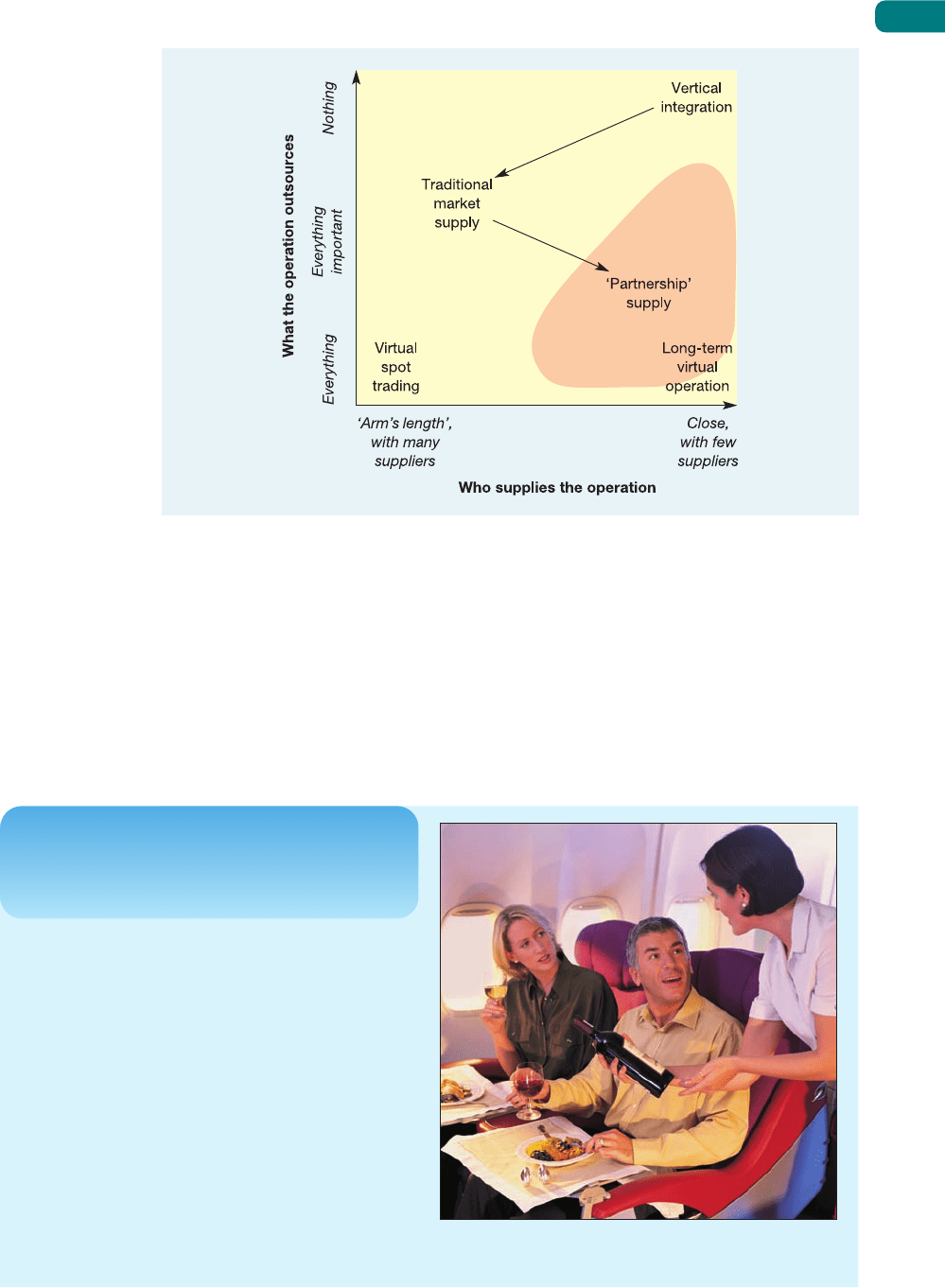
‘how important are the activities outsourced (from outsourcing only trivial activities at one
extreme, to outsourcing even core activities at the other extreme)? In terms of who is chosen
to supply products and services, again two questions are important, ‘how many suppliers will
be used by the operation (from using many suppliers to perform the same set of activities
at one extreme, through to only one supplier for each activity at the other extreme), and
‘how close are the relationships (from ‘arm’s length’ relationships at one extreme, through
to close and intimate relationships at the other extreme)? Figure 13.6 illustrates this way of
characterizing relationships. It also identifies some of the more common types of relationship
and shows some of the trends in how supply chain relationships have moved.
Chapter 13 Supply chain planning and control
387
Figure 13.6 Types of supply chain relationship
The companies that provide airline catering services are
in a tough business. Meals must be of a quality that is
appropriate for the class and type of flight, yet the airlines
that are their customers are always looking to keep costs
as low as possible, menus must change frequently
(3-monthly) and the airlines must respond promptly to
customer feedback. If this were not enough, forecasting
passenger numbers is particularly difficult. Catering
suppliers are advised of the likely numbers of passengers
for each flight several days in advance, but the actual
minimum number of passengers for each class is only
fixed six hours before take-off (although numbers can
still be increased after this, due to late sales). Also, flight
arrivals are sometimes delayed, putting pressure on
everyone to reduce the turnaround time, and upsetting
work schedules. And even when a flight lands on time
Short case
Northern Foods wins a slice of
the in-flight meals business
10
➔
Source: Virgin Atlantic
Specialized companies have developed that prepare
food in specialized factories, often for several airlines.
M13_SLAC0460_06_SE_C13.QXD 10/20/09 9:45 Page 387

Traditional market supply relationships
The very opposite of performing an operation in-house is to purchase goods and services
from outside in a ‘pure’ market fashion, often seeking the ‘best’ supplier every time it is neces-
sary to purchase. Each transaction effectively becomes a separate decision. The relationship
between buyer and seller, therefore, can be very short-term. Once the goods or services are
delivered and payment is made, there may be no further trading between the parties. The
advantages of traditional market supplier relationships are usually seen as follows:
● They maintain competition between alternative suppliers. This promotes a constant drive
between suppliers to provide best value.
● A supplier specializing in a small number of products or services (or perhaps just one),
but supplying them to many customers, can gain natural economies of scale. This enables
the supplier to offer the products and services at a lower price than would be obtained if
customers performed the activities themselves on a smaller scale.
● There is inherent flexibility in outsourced supplies. If demand changes, customers can
simply change the number and type of suppliers. This is a far faster and simpler alternative
to having to redirect their internal activities.
● Innovations can be exploited no matter where they originate. Specialist suppliers are more
likely to come up with innovative products and services which can be bought in faster and
cheaper than would be the case if the company were itself trying to innovate.
● They help operations to concentrate on their core activities. One business cannot be
good at everything. It is sensible therefore to concentrate on the important activities and
outsource the rest.
There are, however, disadvantages in buying in a totally ‘free market’ manner:
● There may be supply uncertainties. Once an order has been placed, it is difficult to main-
tain control over how that order is fulfilled.
● Choosing who to buy from takes time and effort. Gathering sufficient information and
making decisions continually are, in themselves, activities which need to be resourced.
Part Three Planning and control
388
no more than 40 minutes are allowed before the flight is
ready for take-off again, so complete preparation and
a well-ordered sequence of working is essential. It is a
specialized business, and in order to maintain a fast,
responsive and agile service, airline caterers have
traditionally produced food on, or near, airport sites
using their own chefs and staff to cook and tray-set
meals. The catering companies’ suppliers are also
usually airline specialists who themselves are located
near the caterers so that they can offer very short
response times.
The companies that provide catering services
may also provide related services. For example,
LSG Sky Chefs (a subsidiary of Deutsche Lufthansa
AG) is a provider of tailor-made in-flight services for
all types of airlines around the world. Their main areas
of service are Airline Catering, In-flight Equipment and
Logistics and In-flight Management. They are also
large, employing 30,000 people at 200 customer
service centres in 49 countries. In 2007 they produced
418 million meals for more than 300 airlines,
representing more than 30 per cent of the global
airline catering market.
But the airline sector has over recent years suffered
a series of shocks including 9/11, oil price volatility,
financial crises and world recession. This has meant that
airlines are reviewing their catering supply solutions.
In December 2008 Gate Gourmet, the world’s largest
independent provider of airline catering lost the contract
to supply British Airways’ short-haul flights out of
Heathrow to new entrants into the airline catering
market, a consortium of Northern Foods, a leading food
producer, whose normal business is supplying retailers
with own-label and branded food, and DHL, a subsidiary
of Deutsche Post and the market-leading international
express and logistics company. DHL is already a large
supplier to ‘airside’ caterers at Heathrow and already
has its own premises at the airport. Northern Foods will
make the food at its existing factories and deliver it to
DHL, which will assemble onto airline catering trays and
transfer them onto aircraft. The new contract is the first
time that Northern Foods, whose biggest customer is
Marks and Spencer, the UK retail chain, has developed
new business outside its normal supermarket customer
base. It said it was ‘delighted to have been chosen by
BA based on the quality of our food’.
Short-term transactional
relationships
M13_SLAC0460_06_SE_C13.QXD 10/20/09 9:45 Page 388

● There are strategic risks in subcontracting activities to other businesses. An over-reliance
on outsourcing can ‘hollow out’ the company, leaving it with no internal capabilities which
it can exploit in its markets.
Short-term relationships may be used on a trial basis when new companies are being con-
sidered as more regular suppliers. Also, many purchases which are made by operations are
one-off or very irregular. For example, the replacement of all the windows in a company’s
office block would typically involve this type of competitive-tendering market relationship.
In some public-sector operations, purchasing is still based on short-term contracts. This is
mainly because of the need to prove that public money is being spent as judiciously as possible.
However, this short-term, price-oriented type of relationship can have a downside in terms
of ongoing support and reliability. This may mean that a short-term ‘least-cost’ purchase
decision will lead to long-term high cost.
Virtual operations
An extreme form of outsourcing operational activities is that of the virtual operation. Virtual
operations do relatively little themselves, but rely on a network of suppliers that can provide
products and services on demand. A network may be formed for only one project and then
disbanded once that project ends. For example, some software and Internet companies are
virtual in the sense that they buy in all the services needed for a particular development.
This may include not only the specific software development skills but also such things
as project management, testing, applications prototyping, marketing, physical production,
and so on. Much of the Hollywood film industry also operates in this way. A production
company may buy and develop an idea for a movie, but it is created, edited and distributed
by a loose network of agents, actors, technicians, studios and distribution companies. The
advantage of virtual operations is their flexibility and the fact that the risks of investing in
production facilities are far lower than in a conventional operation. However, without any
solid base of resources, a company may find it difficult to hold onto and develop a unique
core of technical expertise. The resources used by virtual companies will almost certainly be
available to competitors. In effect, the core competence of a virtual operation can only lie in
the way it is able to manage its supply network.
‘Partnership’ supply relationships
Partnership relationships in supply chains are sometimes seen as a compromise between
vertical integration on the one hand (owning the resources which supply you) and pure
market relationships on the other (having only a transactional relationship with those who
supply you). Although to some extent this is true, partnership relationships are not only a
simple mixture of vertical integration and market trading, although they do attempt to achieve
some of the closeness and coordination efficiencies of vertical integration, but at the same
time attempt to achieve a relationship that has a constant incentive to improve. Partnership
relationships are defined as: ‘relatively enduring inter-firm cooperative agreements, involving
flows and linkages that use resources and/or governance structures from autonomous organiza-
tions, for the joint accomplishment of individual goals linked to the corporate mission of each
sponsoring firm’.
11
What this means is that suppliers and customers are expected to cooperate,
even to the extent of sharing skills and resources, to achieve joint benefits beyond those they
could have achieved by acting alone. At the heart of the concept of partnership lies the issue
of the closeness of the relationship. Partnerships are close relationships, the degree of which
is influenced by a number of factors, as follows:
● Sharing success. An attitude of shared success means that both partners work together in
order to increase the total amount of joint benefit they receive, rather than manoeuvring
to maximize their own individual contribution.
Virtual operation
Partnership relationships
Chapter 13 Supply chain planning and control
389
M13_SLAC0460_06_SE_C13.QXD 10/20/09 9:45 Page 389

● Long-term expectations. Partnership relationships imply relatively long-term commitments,
but not necessarily permanent ones.
● Multiple points of contact. Communication between partners is not only through formal
channels, but may take place between many individuals in both organizations.
● Joint learning. Partners in a relationship are committed to learn from each other’s experi-
ence and perceptions of the other operations in the chain.
● Few relationships. Although partnership relationships do not necessarily imply single sourc-
ing by customers, they do imply a commitment on the part of both parties to limit the
number of customers or suppliers with whom they do business. It is difficult to maintain
close relationships with many different trading partners.
● Joint coordination of activities. Because there are fewer relationships, it becomes possible
jointly to coordinate activities such as the flow of materials or service, payment, and so on.
● Information transparency. An open and efficient information exchange is seen as a key
element in partnerships because it helps to build confidence between the partners.
● Joint problem-solving. Although partnerships do not always run smoothly, jointly approach-
ing problems can increase closeness over time.
● Trust. This is probably the key element in partnership relationships. In this context, trust
means the willingness of one party to relate to the other on the understanding that the
relationship will be beneficial to both, even though that cannot be guaranteed. Trust is
widely held to be both the key issue in successful partnerships, but also, by far, the most
difficult element to develop and maintain.
Customer relationship management (CRM)
There is a story (which may or may not be true) that is often quoted to demonstrate the import-
ance of using information technology to analyse customer information. It goes like this:
Wal-Mart, the huge US-based supermarket chain, did an analysis of customers’ buying habits
and found a statistically significant correlation between purchases of beer and purchases of
diapers (nappies), especially on Friday evenings. The reason? Fathers were going to the super-
market to buy nappies for their babies, and because fatherhood restricted their ability to go
out for a drink as often, they would also buy beer. Supposedly this led the supermarket to
start locating nappies next to the beer in their stores, resulting in increased sales of both.
Whether it is true or not, it does illustrate the potential of analysing data to understand
customers. This is the basis of customer relationship management (CRM). It is a method of
learning more about customers’ needs and behaviours in order to develop stronger relation-
ships with them. Although CRM usually depends on information technology, it is misleading
to see it as a ‘technology’. Rather it is a process that helps us to understand customers’ needs
and develop ways of meeting those needs while maximizing profitability. CRM brings together
all the disparate information about customers so as to gain insight into their behaviour and
their value to the business. It helps to sell products and services more effectively and increase
revenues by:
● Providing services and products that are exactly what your customers want
● Retaining existing customers and discovering new ones
● Offering better customer service
● Cross-selling products more effectively.
CRM tries to help organizations understand who their customers are and what their
value is over a lifetime. It does this by building a number of steps into its customer interface
processes. First, the business must determine the needs of its customers and how best to
meet those needs. For example, banks may keep track of its customers’ age and lifestyle so
that it can offer appropriate products like mortgages or pensions to them when they fit their
needs. Second, the business must examine all the different ways and parts of the organization
where customer-related information is collected, stored and used. Businesses may interact
Part Three Planning and control
390
Customer relationship
management
M13_SLAC0460_06_SE_C13.QXD 10/20/09 9:45 Page 390

with customers in different ways and through different people. For example, sales people, call
centres, technical staff, operations and distribution managers may all, at different times, have
contact with customers. CRM systems should integrate these data. Third, all customer-related
data must be analysed to obtain a holistic view of each customer and identify where service
can be improved.
Chapter 13 Supply chain planning and control
391
Despite its name, some critics of CRM argue that the greatest shortcoming is that it is
insufficiently concerned with directly helping customers. CRM systems are sold to execu-
tives as a way to increase efficiency, force standardized processes and gain better insight
into the state of the business. But they rarely address the need to help organizations
resolve customer problems, answer customer questions faster, or help them solve their
own problems. This may explain the trend towards a shift in focus from automating internal
front-office functions to streamlining processes such as online customer support.
Critical commentary
Supply chain behaviour
A fundamental question in supply chain management is: ‘How should supply chains be
managed when operations compete in different ways in different markets?’ One answer, pro-
posed by Professor Marshall Fisher of Wharton Business School, is to organize the supply chains
serving those individual markets in different ways.
12
He points out that many companies have
seemingly similar products which, in fact, compete in different ways. Shoe manufacturers may
produce classics which change little over the years, as well as fashions which last only one or
two seasons. Chocolate manufacturers have stable lines which have been sold for 50 years,
but also product ‘specials’ associated with an event or film release, maybe selling only for a
few months. Demand for the former products will be relatively stable and predictable, but
demand for the latter will be far more uncertain. Also, the profit margin commanded by
the innovative product will probably be higher than that of the more functional product.
However, the price (and therefore the margin) of the innovative product may drop rapidly
once it has become unfashionable in the market.
The supply chain policies which are seen to be appropriate for functional products and
innovative products are termed by Fisher efficient supply chain policies and responsive
supply chain policies, respectively. Efficient supply chain policies include keeping inventories
low, especially in the downstream parts of the network, so as to maintain fast throughput
and reduce the amount of working capital tied up in the inventory. What inventory there
is in the network is concentrated mainly in the manufacturing operation, where it can keep
utilization high and therefore manufacturing costs low. Information must flow quickly up
and down the chain from retail outlets back up to the manufacturer so that schedules can
be given the maximum amount of time to adjust efficiently. The chain is then managed to
make sure that products flow as quickly as possible down the chain to replenish what few
stocks are kept downstream. By contrast, responsive supply chain policy stresses high service
levels and responsive supply to the end-customer. The inventory in the network will be
deployed as closely as possible to the customer. In this way, the chain can still supply even
when dramatic changes occur in customer demand. Fast throughput from the upstream
parts of the chain will still be needed to replenish downstream stocks. But those downstream
stocks are needed to ensure high levels of availability to end-customers. Figure 13.7 illustrates
how the different supply chain policies match the different market requirements implied by
functional and innovative products.
Efficient supply chains
Responsive supply chains
M13_SLAC0460_06_SE_C13.QXD 10/20/09 9:45 Page 391
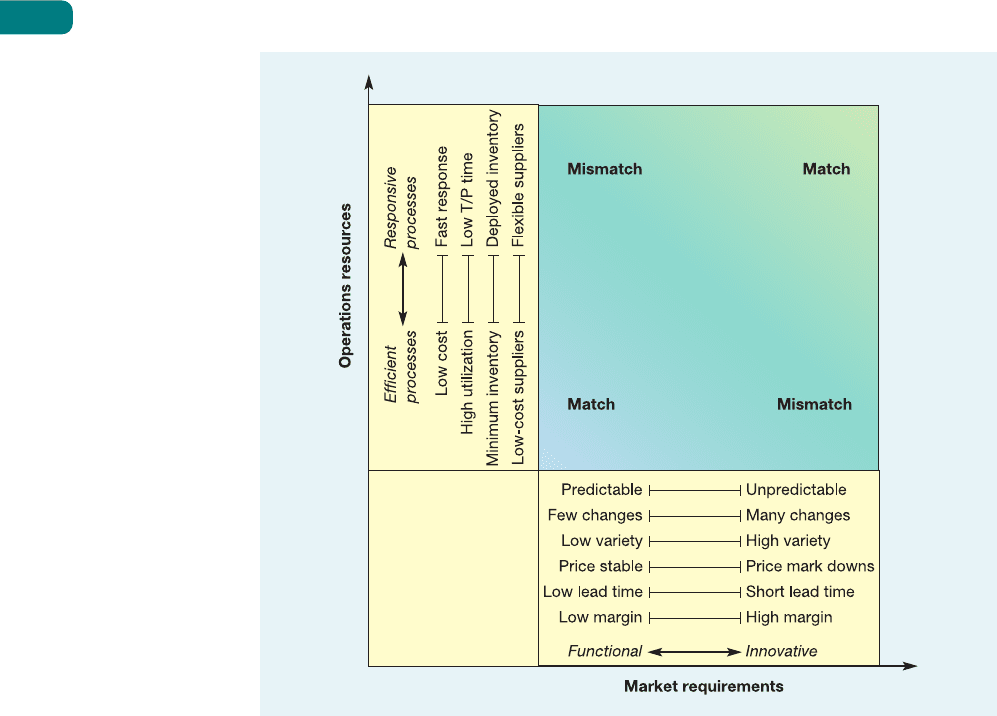
The bullwhip effect – supply chain dynamics
The ‘bullwhip effect’, is used to describe how a small disturbance at the downstream end
of a supply chain causes increasingly large disturbances, errors, inaccuracies and volatility
as it works its way upstream. Its main cause is an understandable desire by the different
links in the supply chain to manage their production rates and inventory levels sensibly. To
demonstrate this, examine the production rate and stock levels for the supply chain shown
in Table 13.4. This is a four-stage supply chain where an original equipment manufacturer
(OEM) is served by three tiers of suppliers. The demand from the OEM’s market has been
running at a rate of 100 items per period, but in period 2 demand reduces to 95 items. All
stages in the supply chain work on the principle that they will keep in stock one period’s
demand (a simplification but not a gross one). The ‘stock’ column shows the starting stock
at the beginning, and the finish stock at the end, of the period. At the beginning of period 2,
the OEM has 100 units in stock. Demand in period 2 is 95 and the OEM must produce enough
to finish up at the end of the period with 95 in stock (this being the new demand rate). To
do this, it need only manufacture 90 items; these, together with 5 items taken out of the
starting stock, will supply demand and leave a finished stock of 95 items and the OEM can
operate at a steady rate of 95 items per period. Note, however, that a change in demand of
only 5 items has produced a fluctuation of 10 items in the OEM’s production rate.
Now carry this same logic through to the first-tier supplier. At the beginning of period 2,
the second-tier supplier has 100 items in stock. The demand which it has to supply in period 2
is derived from the production rate of the OEM. This has dropped down to 90 in period 2. The
Part Three Planning and control
392
Figure 13.7 Matching the operations resources in the supply chain with market requirements
Source: Adapted from Fisher, M.C. (1997) What is the right supply chain for your product? Harvard Business Review,
March–April, 105–16.
The bullwhip effect
M13_SLAC0460_06_SE_C13.QXD 10/20/09 9:45 Page 392
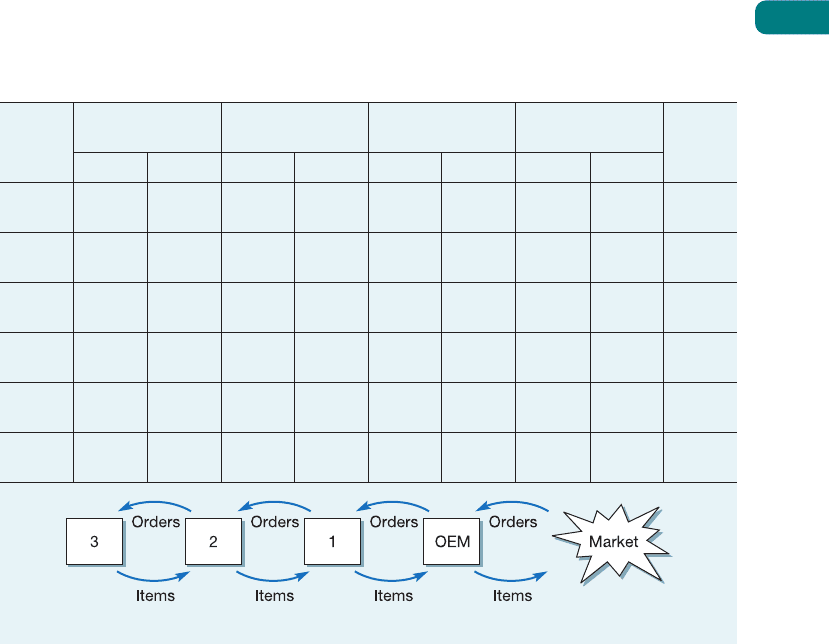
first-tier supplier therefore has to produce sufficient to supply the demand of 90 and leave
one month’s demand (now 90 items) as its finish stock. A production rate of 80 items per
month will achieve this. It will therefore start period 3 with an opening stock of 90 items, but
the demand from the OEM has now risen to 95 items. It therefore has to produce sufficient
to fulfil this demand of 95 items and leave 95 items in stock. To do this, it must produce
100 items in period 3. This logic can be extended right back to the third-tier supplier. The
further back up the supply chain an operation is placed, the more drastic are the fluctuations
caused by the relatively small change in demand from the final customer. The decision of
how much to produce each month was governed by the following relationship:
Total available for sale in any period = Total required in the same period
Starting stock + Production rate = Demand + Closing stock
Starting stock + Production rate = 2 × Demand (because closing stock must be
equal to demand)
Production rate = 2 × Demand − Starting stock
This relatively simple exercise does not include any time lag between a demand occurring in
one part of the supply chain and it being transmitted to its supplier. In practice there will be
such a lag, and this will make the fluctuations even more marked.
Miscommunication in the supply chain
Whenever two operations in a supply chain arrange for one to provide products or services
to the other, there is the potential for misunderstanding and miscommunication. This may be
caused simply by not being sufficiently clear about what a customer expects or what a supplier
is capable of delivering. There may also be more subtle reasons stemming from differences
in perception of seemingly clear agreements. The effect is analogous to the children’s game
of ‘Chinese whispers’. The first child whispers a message to the next child who, whether he
or she has heard it clearly or not, whispers an interpretation to the next child, and so on. The
more children the message passes between, the more distorted it tends to become. The last
Chapter 13 Supply chain planning and control
393
Table 13.4 Fluctuations of production levels along supply chain in response to small change
in end-customer demand
Third-tier Second-tier First-tier Original
supplier supplier supplier equipment mfr
Prodn. Stock Prodn. Stock Prodn. Stock Prodn. Stock
1 100 100 100 100 100 100 100 100 100
100 100 100 100
2 20 100 60 100 80 100 90 100 95
60 80 90 95
3 180 60 120 80 100 90 95 95 95
120 100 95 95
4 60 120 90 100 95 95 95 95 95
90 95 95 95
5 100 90 95 95 95 95 95 95 95
95 95 95 95
6 95 959595959595 9595
95 95 95 95
(Note all operations keep one period’s inventory.)
Period
Demand
M13_SLAC0460_06_SE_C13.QXD 10/20/09 9:45 Page 393
